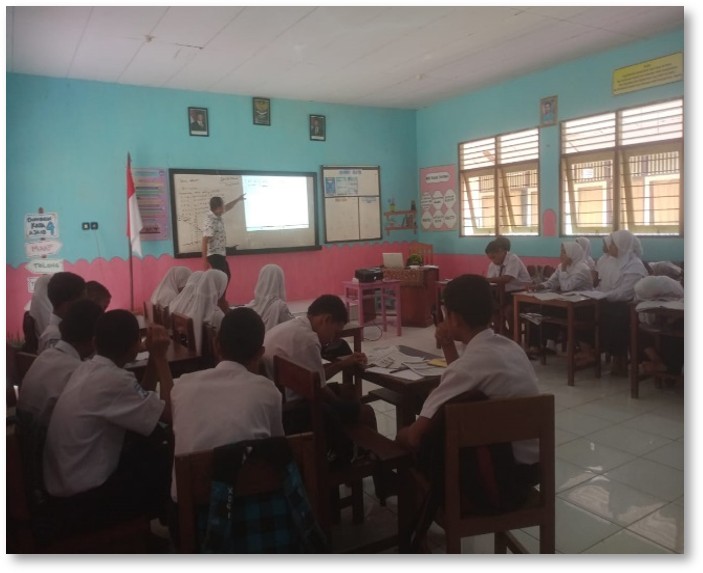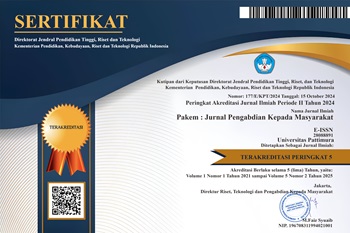IMPLEMENTASI GEOGEBRA DALAM MATERI GRAFIK FUNGSI LINIER PADA SISWA SMP NEGERI 30 MALUKU TENGAH
Abstract
Digital transformation has brought about major changes in the world of education. Many applications have been created to facilitate learning in the classroom. GeoGebra is one such application that has been developed with simpler features so that students can apply it effectively. Community service activities are an important moment for universities to disseminate their research results. The Mathematics Education Study Program also takes part in efforts to improve the quality of education in Maluku through community service programs (PkM) based on research conducted by lecturers and collaborations between lecturers and students, particularly those related to the use of GeoGebra. This activity is necessary because mathematics is abstract in nature, making it difficult for many students to understand the material well. This condition was also found during the initial observation by the community service team at SMP Negeri 30 Maluku Tengah. Therefore, mathematics education lecturers and students conducted community service (PkM) at SMP Negeri 30 Maluku Tengah with a seminar and training approach, one of which was about the use of GeoGebra in linear function graph material. The students' responses showed that (1) Students felt that GeoGebra helped them solve math problems (mean of 4.04 with a good rating); (2) The development of GeoGebra software was easier to apply so that students could use it well (mean of 3.92 with good criteria); and (3) Students were more enthusiastic about learning mathematics and wanted better grades from their mathematics learning (mean of 3.93 with good criteria).
Downloads
References
Ainun, P. J., Mawarni, S.H., Sakina, L., Lestari, A. N., & Hariayadi, T. (2022). Identifikasi Transformasi Digital Dalam Dunia Pendidikan Mengenai Peluang Dan Tantangan Di Era Disrupsi. Jurnal Kewarganegaraan, 6(1), pp. 1570-1580
Ariaton, B. (2022). Pedagogi Digital Dalam Pendidikan Indonesia di Masa Pandemi Covid-19. Jurnal Cerdik: Jurnal Pendidikan dan Pengajaran, 2(1), pp. 87-99
Daud, M.S., & Irwan, M. H. I. N. (2024). Measuring Succses: Evaluating the Impact of Industry Involvement on the Sustanability of Work-Based Learning Programs in Polytechnics. MISTER: Jurnal of Multidisciplinary Inquiry in Science Technology And Educational Reasearch, 1(3), pp. 314-319
Fausan, A. G., Agina, S., & Setiawan, W. (2020). Analisis Kemampuan Dan Kesulitan Dalam Menyelesaikan Soal Berpikir Logis Matematik Siswa SMP Dengan Penggunaan Geogebra. Jurnal Cedekian: Jurnal Pendidikan Matematika, 4(1), pp. 53-63
Huda, S., Ikhlas, A., Rukhmana, T., & Huriati, N. (2023). Efektifitas Aplikasi Geogebra Terhadap ketrampilan Berpikir Kritis Matematika Siswa: Jurnal on Education, 5(4), pp. 13307-13314
Ikhlas, A., Faturahman., & Fitrah, M. (2023). Software Geogebra Pada Pembelajaran Matematika: Studi Literatur: Jurnaal Ilmiah Matematika Realistik (JI-MR), 4(1), pp. 33-40
Jaya, H., Hambali, M., & Fakhrorrosi. (2023). Transformasi Pendidikan: Peran Pendidikan Berkelanjutan dalam Menghadapi Abad Ke-21: Jurnal Rivieu Pendidikan dan Pengajaran, 6(4), pp. 2416-2422
Japa, N., Suaarjana., & Widiana. (2017). Media Geogebra dalam Pembelajaran Matematika. International Journal of NaturalScience and Engineering. 1(2), pp. 40-47
Ledoh, C. C., Judiyanto, L., Hartati, T., Apriyanto, H., Pamangin, W. W., & Haluti, F. (2025). Pendidikan Abad 21 (Menyambut Transformasi Dunia Pendidikan di Era Society 5.0): PT Sonpedia Publishing Indonesia, Anggota IKAPI
Lestari, L., Mulyono., & Syafari. (2019). The Effect Of Reciprocal Peer Tutoring Strategy Assisted by On Student Mathematics Communoication Ability Reviewed From Gender. Education Quartrly Reviews, 2(2), pp. 292-298.
Napiyanti, D., Turmudi., & Prabawanto, S. (2016). Penerapan Pembelajaran Matematika Realistik Berbantuan GeoGebra untuk Meningkatkan Kemampuan Komunikasi Matematis Siswa. Jurnal Pendidikan Matematika STKIP Garut. 5(2), pp. 45-52
Pauweni, K. A. Y., & Iskandar, M. E. B. (2021). Meningkatkan Kemampuan Pemecahan Masalah Matematika Melalui Model Problem-Based Learning Pada Materi Bilangan Pecahan. Euler : Jurnal Ilmiah Matematika, Sains Dan Teknologi, 8(1), 23–28.
Putri, N. R., Sabandar, J., & Sugandi, A. I. (2021). The Development Teaching Materials On The Area Of Triangles And Quardrilaterals By Using Geogebra-Assisted Discovery Learning Method To Improve Mathematics Understanding Ability. JIML: Journal Of Innovaive Mathematics Learning, 4(3), pp. 132-141
Ramadhan, R. S., Wirdani, R. R., Delpina, H., & Nelwati, S. (2025). Pendidikan di Era Informasi dan Kominikasi. Jurnal Media Akademik (JMA), 3(1), pp. 1-12
Suciati, I., Mailili, H. W., & Hejarina. (2022). Implementasi Geogebra Terhadap Kamampuan Matematis Peserta Didik Dalam Pembelajaran: A Systemic Literature Review .Teorema: Teori dan Riset Matematika, 7(1), pp. 27-42
Sianipar, F. H., Nuranisah., & Silalahi, T. (2024). Analisis Penggunaan Media Pembelajaran Berbasis Aplikasi Geogebra dalam Pembelajaran Matematika: Indonesian Reasearch Journal on Education, 4(4), pp. 2236-2241
Suryawan, P. P. I., & Pernama, D. (2020). Media Pembelajaran Online Berbasis Geogebra sebagai Upaya Meningkatkan Pemahaman Konsep Matematika. Jurnal Prisma, 9(1), pp. 108-117
Sutpo, A. N & Ratu, N. (2022). Pengembangan Media Pembelajaran GeoGebra Classroom Sebagai Penguatan Pemahaman Konsep Materi Translasi Siswa SMP Kelas IX. Jurnal Cendikia: Jurnal Pendidikan Matematika, 6(1), pp. 10-23

Copyright (c) 2025 PAKEM : Jurnal Pengabdian Kepada Masyarakat

This work is licensed under a Creative Commons Attribution-NonCommercial-ShareAlike 4.0 International License.
Authors who publish with PAKEM: Jurnal Pengabdian Kepada Masyarakat agree to the following terms:
- Authors grant copyright to the journal and right of first publication with the work simultaneously licensed under a Creative Commons Attribution License (CC BY-NC-SA 4.0)
- Authors are able to enter into separate, additional contractual arrangements for the non-exclusive distribution of the journal's published version of the work (e.g., post it to an institutional repository or publish it in a book), with an acknowledgment of its initial publication in this journal.
- Authors are permitted and encouraged to post their work online (e.g., in institutional repositories or on their website) prior to and during the submission process, as it can lead to productive exchanges, as well as earlier and greater citation of published work.

1.png)













